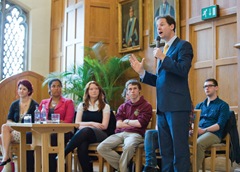Nick Clegg in Belfast
 Meadhbh Monahan observed Deputy Prime Minister Nick Clegg at Queen’s University Belfast.
Meadhbh Monahan observed Deputy Prime Minister Nick Clegg at Queen’s University Belfast.
Strolling through the Great Hall in Queen’s University, pointing and remarking on the many portraits of alumni and former chancellors, Nick Clegg quipped that he was more used to holding his ‘town hall’ meetings in church halls and school gyms.
Following a morning of debate about whether severely cutting Northern Ireland’s public sector expenditure would dishonor the previous government’s
£18 billion commitment to the region, Clegg was back in familiar territory. He became adept at handling question and answer sessions during the general election debates. And, true-to-form, he took questions from politics students and lecturers without notes and answered them at a fast pace, even passing his own microphone to a student in order to speed proceedings up. Although he said he was “keen” to answer questions about Northern Ireland, the questions had a UK wide theme and his answers were more of the same rhetoric that we have heard before.
One student previously worked in the Treasury, and his contacts tell him that government plans for regulating the banks will not do enough to stop an economic crisis from happening again. Clegg hoped that by 2015 the Government “can show you that we have sorted out the deficit [and] that banks are lending again to a mix of public and private institutions in a way that points the country towards a sustainable future.”
Responding to a lecturer who asked Clegg why he chose to ignore fellow Liberal John Maynard Keynes and opt for an “economically illiterate” economic policy that is destined to fail, he said: “I don’t accept for one minute that blanket Keynesianism works. My own view, which is prevalent in Liberal Democrat thinking, is that there is nothing fair at all about handing your debts on to the next generation.” Clegg added that the current deficit will not simply be eroded by growth.
An American masters student put it to him that she was successful and could contribute to the UK economy but didn’t have enough points to remain in the country. Clegg blamed Labour for introducing the system and claimed “there are glitches” that need to be looked at.
So far, the “two odd bedfellows” in the Coalition have “confounded” people, Clegg said. The Coalition has created a shift away from the “highly tribal” politics and the usual “amplified antagonisms” which had previously been “messing people’s mental maps.” Voters are becoming “choosy” and are less inclined to vote the same way as their parents.
He added: “I hope the historians will say this was the moment the old icebergs of British politics gave way to more choice, diversity and pluralism in politics.”
Another lecturer challenged Clegg on how he plans to keep his party happy after “they lose this referendum” on the electoral reform. Clegg asked him if he had a crystal ball and replied that he was confident that the referendum would find in favour of the alternative vote. He also defended calling the referendum on the same day as devolved elections, saying people would rather vote for everything on the same day.
With that, the second most powerful man in Britain was off, accompanied by Owen Paterson, and a contingent of 15 civil servants and press officers.
As the Liberal Democrat leader made his way to the cavalcade of Range Rovers and Mercedes Benz outside, a ‘protest’ of four students shouted: “Tory, Tory, Tory, out, out, out.”





